|
|
|
Sort Order |
|
|
|
Items / Page
|
|
|
|
|
|
|
| Srl | Item |
| 1 |
ID:
134144
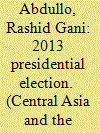

|
|
|
|
|
| Publication |
2014.
|
| Summary/Abstract |
The author looks at the problem of the legitimacy of the 2013 presidential election in Tajikistan as a sine qua non of social and political stability and, consequently, of the country's security and territorial integrity. In Tajikistan's specific case, the election could only be legitimate if the opposition forces, primarily the Islamic Revival Party of Tajikistan (IRP), which comes second after the institution of presidential power as the most influential political force, did not boycott it.
Despite the easily predicted results (another term for President Rakhmon), the IRP leaders decided to take part in the process: an Islamic revival could only take place in a politically stable Tajikistan. To gain public legitimacy for their decision, they organized a series of consultations with representatives of the public to formulate and realize the idea of an Alliance of the Reformist Forces of Tajikistan (ORST), which nominated human rights activist Oinihol Bobonazarova as its joint presidential candidate. She did not run because, after failing to present the necessary number of signatures gathered in her support to the Central Election Commission, she was not registered as a candidate. The IRP leaders abstained from voting, but denied all accusations of boycotting the election.
President Rakhmon, who won the election, and the IRP, which stuck resolutely to its course and was able to keep the Islamic revival going, were both winners. The country benefited the most-the election did not shake the frail stability, while Tajikistan's enemies lost another chance to interfere in its domestic affairs with destructive intentions.
|
|
|
|
|
|
|
|
|
|
|
|
|
|
|
|
| 2 |
ID:
134134
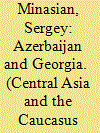

|
|
|
|
|
| Publication |
2014.
|
| Summary/Abstract |
The relations between Georgia and Azerbaijan are a key factor in regional politics and security in the Southern Caucasus. They strongly affect economic contacts and trade, as well as the implementation of all sorts of communication and energy projects. The two countries agree on many issues of regional policy, the way ethnopolitical conflicts should be settled, and the degree to which external actors could or should be involved. Turkey's presence in bilateral Georgian-Azeri relations is another important factor that may end in a geopolitical triangle of sorts in the Southern Caucasus. On the other hand, these relations cannot and should not be described as a formalized full-scale political, let alone, military-political alliance with corresponding mutual obligations. The author discusses these and other aspects of bilateral relations, assesses the prospects for further cooperation, and points to the possible challenges and problems that might crop up later.
|
|
|
|
|
|
|
|
|
|
|
|
|
|
|
|
| 3 |
ID:
134136
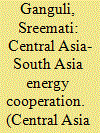

|
|
|
|
|
| Publication |
2014.
|
| Summary/Abstract |
This article focuses on India's energy security demands, as well as the energy security scenario of its immediate neighbors, mainly Pakistan and Afghanistan, and of its strategic neighborhood, i.e. the Central Asian countries. It attempts to concentrate on the factor of energy interdependence among these countries and argues that the possibility of an interregional energy cooperation mechanism is essential for energy security, and ultimately, stability in the wider region. A concept of interregional cooperation based on interdependence is vital for security in the broad sense of the term. These two neighboring regions do enjoy energy interdependence. The wider region has all three ingredients of the energy supply chain-the Central Asian countries as producers, Afghanistan and Pakistan as both transit and market states, and India as the market to make this cooperation feasible. But there has scarcely been any serious effort to put this energy chain into a meaningful dependency variable. For both regions, the other always seems too distant, either as a source or as a market. The continuing insecurity in Afghanistan and bilateral distrust between India and Pakistan are two of the major factors that always put energy relations between Central and South Asia on the backburner. But future prospects may not be so bleak, since the changing security scenario in Afghanistan calls for greater regional economic cooperation, which will be beneficial for Afghan economic reconstruction. More important, it will make the regional states shareholders not only in the Afghan reconstruction process, but also in ensuring greater interregional cooperative mechanisms as well. It is widely believed that energy as a product is a factor of geopolitical and geo-economic conflicts the world over, and there is also plenty of supporting evidence. This article, on the other hand, focuses on the potential of using energy as a vector of alliance in the regional and interregional context.
|
|
|
|
|
|
|
|
|
|
|
|
|
|
|
|
| 4 |
ID:
134130
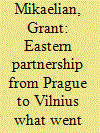

|
|
|
|
|
| Publication |
2014.
|
| Summary/Abstract |
On 28-29 November, 2013, Vilnius hosted the 3rd Eastern Partnership Summit, at which several former Soviet republics were expected to ascend to a higher institutional level in their relations with the European Union. Belarus and Azerbaijan preferred to step aside, while two other members (Armenia and Ukraine) left the program in the fall of 2013 when the talks were over. Georgia and Moldova initialed, but did not sign, the Association Agreement with the EU. This means that four-and-a-half years of this highly ambitious program produced very modest results, to say the least, very much due to the fact that Ukraine, the region's biggest player, excused itself from signing.This did not put a full-stop to the relations between the Eastern Partnership (EP) members and the EU, however the Vilnius Summit marked an intermediate finish of sorts. The old strategy ran into a dead end, leaving Brussels without a new strategy for its relations with its Eastern neighbors. To move forward, the EU should try to find out what went wrong. We should analyze what has happened and why. Here I have tried to comprehend how the relations between the EU and Soviet successor-states developed under the project to provide (probably delayed) answers to the following questions:
1. Did the summit fail because Russia was very skeptical about the results of European integration for its neighbors?
2. Why did this problem come to the fore in mid-2013 rather than in 2008 when it all started?
3. Why did the Russian factor (described as an imminent threat to the European programs on the post-Soviet space) remain neglected?
To correctly understand the motivation of what has been done and to avoid unsubstantiated assessments, we need to look at what happened in Vilnius from the perspective of Brussels, Moscow, and the post-Soviet capitals involved.
I will rely on the chronology of the EP project divided into three key periods:
-from May 2008 when the program was announced to May 2009 when it started;
|
|
|
|
|
|
|
|
|
|
|
|
|
|
|
|
| 5 |
ID:
134131
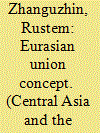

|
|
|
|
|
| Publication |
2014.
|
| Summary/Abstract |
The author probes deep into the concept of Eurasianism, the subject of heated discussions interpreted as an integration attempt in the post-Soviet expanse. He looks at the idea of Eurasianism as a civilizational project designed to unify all entities of the geostrategic expanse into a single whole. This multilayered problem cannot be exhaustively analyzed in one or even several dozen articles. Nevertheless, the subject deserves clarification as a target of analysis.
The political and economic vs. civilizational discourse looks very much like the chicken or the egg dilemma. The author prefers a civilizational discourse, although many will probably disagree with him.
|
|
|
|
|
|
|
|
|
|
|
|
|
|
|
|
| 6 |
ID:
134137


|
|
|
|
|
| Publication |
2014.
|
| Summary/Abstract |
The recent geopolitical events, and primarily those unfolding along the West-Russia trajectory, have dramatically changed the forecast of how long the EU can continue using Russian energy resources. The European countries wish to slowly free themselves from their energy dependence on Russia and make new adjustments to the conceptual approaches to this problem. In particular, the EU has been actively fortifying its position in the Black Sea-Caspian Region by dividing it into two key strategic components-the Southern Caucasus and the Caspian.
The Eastern Partnership Program, which extends to Georgia, Ukraine, Azerbaijan, Moldova, Armenia, and Belarus, has implied close cooperation between these post-Soviet countries and the EU at all levels from the very beginning. The Europeans find these countries easier to understand in historical and cultural terms than the Central Asian countries.
The energy-rich countries (Azerbaijan, Turkmenistan, and Iran) and countries with considerable transit capacities (Turkey and Georgia) have found themselves in the epicenter of the European establishment's attention. At the beginning of 2014, several important new projects for the South Caucasian Region were articulated (Nabucco, Nabucco West, TAP, Shah Deniz-2, and others).
The EU is now faced with making an urgent choice between its former dependence on Russia or undertaking gradual modernization by finding new energy partners. In this respect, the most radical part of European society is willing to engage in any economically promising cooperation (in the form of low energy prices), as long as it is not with Russia or the U.S.
The rest of society holds a more moderate position in favor of diversifying suppliers; it is not against either Russian energy resources or American shale gas, but is also considering alternative energy sources.
It should be noted that, on the whole, the EU inclines more toward the second scenario.
However, after making its South Caucasian choice, the EU is not rushing to invest huge sums in the implementation of the energy projects that, as already noted, are being actively discussed by some countries of the region. Moreover, the American factor continues to play an important role: the U.S. is striving to squeeze Russia out of the European energy zone. In so doing, it is clearly striving to monopolize the European regional gas market.
|
|
|
|
|
|
|
|
|
|
|
|
|
|
|
|
| 7 |
ID:
134132
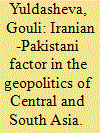

|
|
|
|
|
| Publication |
2014.
|
| Summary/Abstract |
The author has chosen Iran and Pakistan, two giants of the Muslim world, as the subject of her analysis and identifies their place in the context of the geopolitical changes underway in Central and South Asia. She investigates in detail the degree to which their interests are intertwined, as well as the extent of their interaction with other actors (the U.S., Russia, China, India, Saudi Arabia, Afghanistan, and the Central Asian republics).
She also points to the potentially useful factors that might eventually help to overcome all the challenges, risks, and threats that, so far, remain prominent enough to slow down progress in the relations between Iran and Pakistan. The talks between the West and Iran, which have been going on far too long and complicated by the Ukrainian crisis and the rapidly approaching NATO drawdown from Afghanistan, are further destabilizing the already destabilized situation in the AfPak zone. This negatively affects the relations between the two countries, their potential impact on the Central Asian region, and the prospects for the geoprojects related to them.
|
|
|
|
|
|
|
|
|
|
|
|
|
|
|
|
| 8 |
ID:
134139
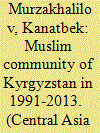

|
|
|
|
|
| Publication |
2014.
|
| Summary/Abstract |
The author analyzes the current state of affairs in the Muslim community of Kyrgyzstan and its relations with the state.
Emerging and developing amid never-ending conflict, the community has inevitably become relatively radicalized (the faithful are divided into jamaats) and, at times, destructive.
The author offers his own cures for the old and new problems of relations between the state and the Muslim community, the resolution of which is absolutely indispensable for their future development.
|
|
|
|
|
|
|
|
|
|
|
|
|
|
|
|
| 9 |
ID:
134140


|
|
|
|
|
| Publication |
2014.
|
| Summary/Abstract |
The author tells us how the Islamic Institute of Tajikistan (until 2007, the Tajik Islamic University) was set up and is developing; he follows the far-from-easy road the official religious education system has covered as part of the process of Islamic revival that began as soon as the country became independent. He also looks at the moving forces and stages of the development of the official higher religious education system in Tajikistan, the key figures involved, and the problems caused by the remnants of the Soviet anti-religious past.
He identifies the main problems-lack of qualified teachers and textbooks-as well as the main obstacle, viz. defects of management and organization of the teaching process and funding, as well as clashes between the traditional and modern principles and methods for teaching religious disciplines.
Much attention is paid to the role of the state in developing official religious education as part of Tajikistan's education system.
The author traces the stages that finally brought the Islamic Institute of Tajikistan under the patronage of the state, a process that transformed the non-state religious educational establishment into a state educational institution.
|
|
|
|
|
|
|
|
|
|
|
|
|
|
|
|
| 10 |
ID:
134133


|
|
|
|
|
| Publication |
2014.
|
| Summary/Abstract |
This article looks at the goals, conditions, and possible consequences of Kyrgyzstan's accession to the Customs Union (CU) and Common Economic Space (CES), describes the current state of the country's export and import situation, and analyzes the role of re-export in the Kyrgyz economy in the past decade. It studies the alleged positive effects and risks that could arise if Kyrgyzstan joins the CU and CES and presents the data of an analysis of the comparative advantages of commodity groups. The authors justify the importance of pursuing a coordinated policy with the other CU countries to develop priority industrial and agricultural sectors. This will encourage large companies to come to Kyrgyzstan and open their branches in the country, as well as help to solve tasks aimed at modernizing agriculture and creating an agroindustrial cluster.
Keeping in mind that commodity flows and business will have to undergo major reorientation after the country joins the CU and CES, the authors conclude that a certain transition period will be needed to enable gentler adaptation of the economy. The authors propose creating a mechanism based on EU experience within the CU and CES to support countries with slower rates of development.
|
|
|
|
|
|
|
|
|
|
|
|
|
|
|
|
| 11 |
ID:
134143
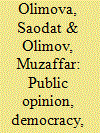

|
|
|
|
|
| Publication |
2014.
|
| Summary/Abstract |
Based on Tajikistan's experience, this article examines the evolution of views, values, and preferences of the population of the Central Asian (CA) countries that support the sustainability of their political regimes. Based on public opinion poll results, this article presents the population's preferences regarding the political system, sheds light on its attitude toward state power and its institutions, and gives assessments of the current regime and efficiency of different forms of citizen engagement. It also looks at the ways citizens participate in state governance and how effectively value judgments are being implemented.
The paper shows that despite the differences in the traditional social institutions of the CA states, as well as in the development paths they have chosen, they are all evolving according to the neopatrimonialism model. However, the evolution of political views in the CA societies shows that democratic values and preferences continue to occupy an important place in the mass consciousness. From this it follows that the government's necessitated support of certain elements of democracy is generated not only by its desire to create a façade or its willingness to make concessions to foreign donors and the international community, but also by social pressure. At the same time, the population's political views and preferences are contradictory and fragmented. They form the base for mass support of democracy, on the one hand, and for social consensus regarding restrictions of citizen rights and recognition of the privileges of heads of state, including patrimonial supremacy, on the other.
|
|
|
|
|
|
|
|
|
|
|
|
|
|
|
|
| 12 |
ID:
134138
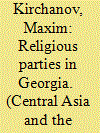

|
|
|
|
|
| Publication |
2014.
|
| Summary/Abstract |
The Georgian Apostolic Autocephalous Orthodox Church plays a significant role in the political and intellectual life of Georgian society. Religious parties are active in Georgia's political landscape. The ideologues and theorists of clerical parties are developing ideas and concepts of Georgian political nationalism and supporting the Georgian language and identity. The ideology of the clerical parties in Georgia is of a mixed nature. The religious parties are developing ideas of political traditionalism. Georgian conservative theorists also support liberal theories in the economic sphere. Political instability is promoting an increase in the moral and political authority of the Church in Georgia. The prospects for the development and transformation of clerical parties are vague and still uncertain.
|
|
|
|
|
|
|
|
|
|
|
|
|
|
|
|
| 13 |
ID:
134142
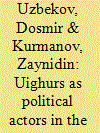

|
|
|
|
|
| Publication |
2014.
|
| Summary/Abstract |
In the Middle Ages, the Uighurs, who are one of the oldest and largest peoples of Central Eurasia (CE), were driven into East Turkestan and then conquered by the Qing Empire. The Chinazation policy carried out in relation to these people led to the mass exodus of the freedom-fighting Uighurs to the CE countries.
The Uighurs are vigorously engaged in economic activity; in other spheres they are traditionally closed and alienated from the outside world, which prevents them from becoming actively integrated into contemporary society.
This article analyzes the roots and reasons for this social phenomenon, which is having a certain influence on the foreign and domestic policy of the Kyrgyz Republic (KR), as well as on political stability and security of the entire Central Asian region.
|
|
|
|
|
|
|
|
|
|
|
|
|
|
|
|
| 14 |
ID:
134141
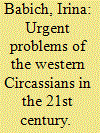

|
|
|
|
|
| Publication |
2014.
|
| Summary/Abstract |
The author analyzes the most urgent problems of the Western Circassians (the Shapsugs of the Caucasian Black Sea coast and the Adighe of the Republic of Adigey) caused by the 2014 Winter Olympics in the Krasnodar Territory, as well as the religious context that took shape after the election of the new mufti of the Republic of Adigey in December 2012.
The article is based on ethnographic field polls carried out in areas populated by Western Circassians, leading the author to conclude that the government should pay more attention to the social, economic, and cultural problems of the Shapsugs of the Black Sea coastal area and concentrate on preventing Islamic radicalization in the Republic of Adigey.
|
|
|
|
|
|
|
|
|
|
|
|
|
|
|
|
| 15 |
ID:
134135
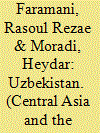

|
|
|
|
|
| Publication |
2014.
|
| Summary/Abstract |
After the collapse of the Soviet Union, the Central Asian states became independent and tried to pursue their foreign policy free from Russian control. Uzbekistan is the only Central Asian state to pursue a proactive and independent foreign policy. Uzbekistan has higher regional power ambitions than the other Central Asian states.
So what is preventing Uzbekistan from fulfilling its dream? It has the necessary subjective and objective prerequisites for this: military potential, a large and fairly homogeneous population, natural resources, favorable geographic location, U.S. support of its secular state, and the willingness of the latter to recognize its regional hegemony. However, the country continues to face several limitations that hinder its leading role. Despite its capabilities, it is not engaging wholeheartedly in regional integration and is hampered by its geographic location, water shortages, structural economic constraints, political problems, and fundamentalism issues.
|
|
|
|
|
|
|
|
|
|
|
|
|
|
|
|
|
|
|
|
|